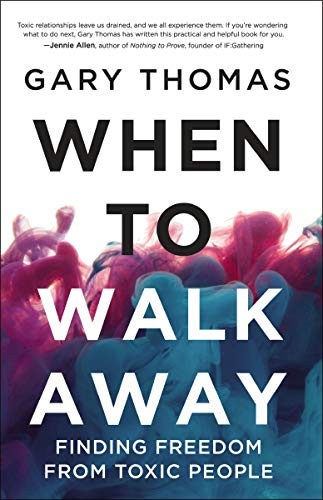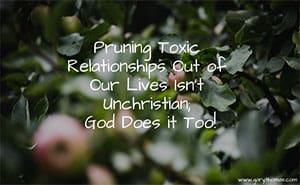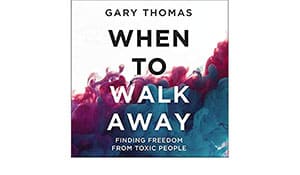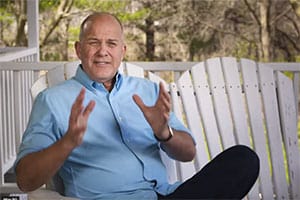Opening:
Teaser:
Woman No. 1: “I had a friend once who didn’t invest in the relationship and needed me to do all the work in order for us to continue having a friendship that meant anything.”
Man: “My ex-wife treats me as if I’m her butler, and have to do whatever she wants, whenever she wants, as soon as she calls, even if I’m in the middle of something else.”
Woman No. 2: “One of the most toxic people I ever met was actually a former news director. She would come out of her office and scream every at the entire newsroom whenever something went wrong, and we all just lived in mortal fear of her.”
End of Teaser
John Fuller: Well, maybe you know someone like that, a person who is more than just annoying or difficult to get along with. They are just negative or maybe even antagonistic toward you. It seems like they’re trying to control your life. And no matter what you say, or you do to please them, it’s never enough. We’re gonna talk about that kind person today on Focus on the Family with your host who is not that kind of person, Jim Daly. (Laughter). And I’m John Fuller.
Jim Daly: I was saying you had so much, uh, emphasis there, John, it sounds like you have experience with toxic people.
John: (Laughter) I might remember a few people along the way who were kinda toxic.
Jim: (Laughter) You know, this is an interesting and difficult subject that we’re going to talk about today. But toxic people are around us. And I think one of the goals I’ve always had is don’t be that. Don’t be a toxic person. And what does it mean to be toxic? We’re gonna cover some of that today with Gary Thomas.
But, um, you know, in reading the material, John, this morning early, which is my habit…
John: Yes.
Jim: …You know, I get up early, 6 a.m., and I’m reading for today’s program. Uh, Jean and I were talking about it, and she related a story that I didn’t even know. But before we met, she was at a church in Southern California. And she said she probably had three or four relationships with women in this church that were just really demanding. And, uh, you know, what she said – they were toxic, that they knew she was a soft touch. And they were pulling from her and demanding from her certain relationship attributes that Jean was getting tired of. You know, it’s exhausting to be around people that are always demanding of you. So I’m looking forward to a very difficult discussion today. You know, as Christians, uh, dealing with people who are hurtful or hostile toward us can be really challenging. And, uh, encounters with toxic people, although may be rare, they do exist. Uh, and we need to understand how Jesus would want us to deal with them. And we’re gonna cover that today, again, with Gary Thomas.
John: And Gary is a prolific author and speaker. He, uh, addresses topics of marriage, parenting and the Christian life. And he’s part of the teaching team and a writer in residence at Second Baptist Church in Houston, Texas. And, uh, he certainly is one of the most popular guests we ever have here, Jim. Uh, his book that we’re gonna to be covering today is, When to Walk Away: Finding Freedom From Toxic People. And we do have that, of course, at focusonthefamily.com/broadcast.
Body:
Jim: Gary, great to have you back to Focus.
Gary Thomas: Well, thank you for having me back.
Jim: How about that for a yearbook, uh, mention? You know, the – the most popular guy who writes about toxic people. (LAUGHTER) Man, that may be an interesting place to start. Uh, you know, we tend to divide ourselves between rough people and maybe easier going people. I’m sure in high school and junior high, we’re learning a lot about that. Is that where this all starts?
Gary: Well, yeah…
Jim: (Laughter).
Gary: I was voted – in junior high, before we went into high school, they had the hall of fame ones, right? And I didn’t get any of the glamour ones. I didn’t get most popular – in my dreams. I didn’t get most athletic. I mean, look at me.
Jim: (Laughter) You are a runner.
Gary: And I didn’t get most likely to succeed. I was way down on the bottom where it said, “Most polite.” (LAUGHTER) So I guess I was the one that was often taken advantage of that because I was so clueless. But I think what led to this is my growing passion. This is part of being part of a church.
This might be a silly story, but my wife has been after me for years to do an elimination diet. Have you guys ever heard about… (Laughter) I could imagine you might have heard of it (ph).
Jim: Eliminate the food in front of you? (Laughter).
Gary: Well, basically, it means you eliminate anything that you like to eat.
Jim: Oh, it’s the opposite.
Gary: The notion is there are foods that are toxic (Laughter) that gradually make you sick. And you go through these blood tests, and they say, “These are troublesome areas.” And then you go through it.
And so LAUGHTER) But the point is – the point is that there are these foods that may just be draining your energy and make ‘em sick. You need to identify ‘em so that you can live with more energy and renewed purpose. And – and that’s what I think is true of ministry. I – you know …
I talked – this is a – an all-star couple. I mean, he’s type A, leader in a couple organizations. You meet ‘em all the time.
Jim: High achievers.
Gary: Jim, you might be the type…
Jim: No, I’m not! (laughter)
Gary: …At work. But he excelled in sports and everything, and – and the wife. And they’re published, and they’re well-known.
And I’m laughing as they’re recounting a time when a woman rings their doorbell. They drop to the floor. (whispers) “Don’t say anything. Be quiet!” I mean, they’re hoping – because, you know, toxic people look through windows. (Laughter) And I’m thinking, how are you these accomplished, healthy…
Jim: Gripped with fear.
Gary: …People? But – but that’s what toxic people can reduce you to, where you are literally hiding in your house, trying not to make a sign – trying not to make a sound, hoping they don’t look through the windows.
Jim: (Laughter) Oh, man.
Gary: But I’ve seen so many of God’s people drained – false guilt, uh, a false sense of responsibility, misunderstanding of some Scriptures.
And it’s making them not just miserable but less effective. And, uh, it was just eye-opening to me when I looked at Jesus’s pattern of ministry and method of ministry, things that – I can’t tell you how many times I’ve read the New Testament – suddenly my eyes were opened. It completely changed the way I looked at life in ministry. Accept the reality of toxic people and look at how Jesus handled them.
Jim: Yeah, and, uh, you have definitely answered my first question, which was what does toxicity in people look like? (Laughter) OK. You have done that perfectly!
But, and this one might even seem like an odd question. But I’d love for you to explain why you believe toxic people are part of Satan’s strategy…
Gary: Yeah.
Jim: …To sideline us. I mean, that sounds so lofty and spiritual, but is that true?
Gary: Here’s where I think it is so subtle and clever. Satan can’t get God’s people to stop caring because God’s spirit makes us care. I know there are a lot of clichés about the church, but I see churches filled. I’ve been in over 500 pulpits. I see Christians sacrificially giving and serving. They’re the ones who are there helping others. There are a few outliers that can be so mean and rejecting. That’s not – it’s not even a tiny minority…
Jim: Correct.
Gary: …Of the Christians I see. And so since Satan knows he can’t get ‘em to stop caring, and he knows how God can use any common believer who’s been a believer for three hours can begin to list his friends – because the Holy Spirit makes any believer a powerful witness for the kingdom.
Instead of getting us to pour that caring out on these fields that are ready to produce great crops, he wants us to pour that care straight into the gutter of toxic people who will resent the care, who reject the truth, who won’t be transformed and will turn on us and make us pay for our good intentions so that we can be so taken up with trying to placate toxic people or recover from toxic people that we’re not investing in reliable people. And for me, when I realized the biblical pattern, if – if we get into it where we focus more on reliable people instead of toxic people, that it’s a biblical precedent to say, “Find qualified, reliable people. Invest generously in them. Don’t waste your time on toxic people,” I found the freedom to walk away from the toxic people.
Jim: And you’re speaking, as you mentioned, as a pastor. So I’m assuming, as you were in your teens and twenties and the Lord was preparing your heart for what he was calling you to do, you are that pastoral heart. You’re wanting to give. And I see that in you. I know you well enough.
Jean, is very similar. And, you know, I think it was John Trent and Gary Smalley who came up with the animal caricatures of personality. And Jean fits that golden retriever.
Gary: That’s me. Oh, yeah, that is – yeah.
Jim: And that’s you. I could see that. And, uh, I’m more of the lion (laughter). And sometimes that’s hard to relate because I think it comes far more naturally for me to say, “Ah, you know what? That person is not behaving appropriately, so I’m kind of done.”
Gary: Yeah.
Jim: There’s kind of errors in both directions, right? And our personalities can play a role in this, correct?
Gary: Yeah, absolutely. And I – what – I lived – and it was pride. I mean, I could say it’s being nice, but there’s an element of sinful people-pleasing that Paul calls out. If I’m trying to please people, I’m not a servant of Christ. But also…
Jim: But don’t jump away from that too quickly because in that, you’re trying to achieve something that’s good. But it…
Gary: Right.
Jim: But it’s rooted in – I guess I could say badness, right?
Gary: Right.
Jim: So you’re trying to pat yourself on the shoulder for being such a good person that you can tolerate this really intolerable person.
Gary: Yeah. Yeah.
Jim: Does that make sense?
Gary: Well, but where it became prideful as well, though, is I had this notion if I could just get more versed in the scriptures, be more surrendered to the Holy Spirit, not have compromise in my life, be expectant and open to the work of God, that somehow everybody I met would have this powerful encounter with Jesus and – and recognize the truth of Jesus and say, “Oh, of course.” And – and then when I…
Jim: And then behave like Jesus.
Gary: Right. (Laughter) But when I saw – when a friend finally saw me hitting my head up against the wall again and again, he’s a counselor of over 35 years. He knows scriptures, and he knows people.
And he finally said to me, “Gary, I want you to read the book of Luke and count how many times Jesus walked away from people or let people walk away from him, encounters where the people weren’t changing.” Well… I think I’ve said to you before, I’m not clinically OCD, but I live in the neighborhood right next door to it. So I – so… (Laughter)
Jim: so you can visit it from…
Gary: So…
Jim: …Time to time. (Laughter).
Gary: A counselor tells me to count Luke, I gotta do all four Gospels, right? (Laughter) I want to get everybody’s perspective. I count – and I wrote down everyone. I counted 41 occasions. Now, the Synoptic Gospels – the common ones contain some of the same instances. But there’s still over a couple dozen distinct instances where Jesus interacted with someone, and he let that person walk away, or he chose to walk away, sometimes blatantly toxic, not always toxic.
But when I realized that Jesus was willing to walk away and let other people walk away, it changed my life. And I could see Jesus letting toxic or close-minded people go and then investing in the reliable people – his disciples. And it’s where I – where we started – so I wanted to pour that water onto fields that were fertile, that needed irrigation, that would produce a crop and not pour that attention and focus into the gutter. Because here’s what I found – it’d be interesting if you guys have had a different experience.
When I look back at every truly toxic person I spent time with, they’re not the better for it, and I’m the worse for it.
Jim: Huh.
Gary: And so I just look back over the course of my life. And I hope I can get some younger listeners saying – you know what? You’ll – when you’re in your 50s, you’re gonna look at this like I did. Learn to find the reliable people, the ready people, the open people, the fruitful people. Invest your time there. That’s the wise kingdom investment.
Jim: And I would think maybe the 80-20 rule applies here? But – and this is something someone’s got to be asking themselves, well, how do you discern between a toxic person and just a hard to get along with person? And we can quickly kind of put somebody in a category that God really does want us to be working with and talking with and influencing.
So what’s the definition of that toxic person that we should do what Jesus did and either walk away or let them walk away and not pursue them?
Gary: One of the big markers of toxic people is that they’re controlling. They want you to do what they want you to do. And the reason this is so astonishing to me is how different God is, that he’s a God who respects our choice.
The Old Testament phrase, “Choose you, this day, whom you will serve” from…
Jim: Right.
Gary: …Joshua. Jesus, in the New Testament, “I stand at the door and knock.” And the way that Jesus let others walk away, as powerful as God is, that’s always right. Nobody is right 100% of the time like God is.
He lets people walk away. He’s not controlling. The New Testament talks about demonic possession. It doesn’t talk about God possession.
Paul says the spirit of the prophets are subject to the control of the prophet – so if somebody’s controlling you, they’re trying to become a little god to you with a little “g.” That’s a toxic thing. Secondly, they just have a murderous spirit. And I’m not just talking about killing us.
They kill reputations. They kill friendships. They kill churches. They kill peace. They – they kill businesses – where you just see this wide swath of death. They destroyed that friendship. They made people afraid to go to the office there. They tore apart that small group. When you look at somebody’s life and the fruit is just destruction after destruction, and then you compare it to God, who opens the Bible by creating life, who ends the Bible creating the new heavens and the new Earth, Jesus saying, “I’m the way, the truth and the life.”
And Jesus said, “Satan, the thief, comes to steal, to kill and to destroy.” So if you see a lot of murder in their life, whether they’re murdering your joy, your peace, your sense of sanity, that’s a bad sign. And then finally, in Colossians 3, Paul lays out what is a very healthy thing when he says that Christians, who are in a healthy situation, are spiritually wired for compassion, kindness, humility, gentleness, patience and love.
Jim: The fruit of the spirit.
Gary: The opposite, though, is this – those who exhibit – and this is Colossians 3:8-9 – anger, rage, malice, slander, filthy language and lying.
And the difference is we might commit some of those. A woman who recognizes her husband or her son is getting addicted may unintentionally control, but it’s out of positive, caring, loving concern; it’s not a toxic thing.
Jim: It’s correction.
Gary: But you recognize what you’re doing, and you want to get rid of it. For toxic people, they come alive when they’re raging. They’re never more fully awake than when they’re lying or they’re using filthy language. They’re at their best when they’re doing their worst. And you just see that, for some reason, they love hate. And so if they’re tearing you down, that’s generally a bad concern. If you see controlling, a murderous spirit and somebody who loves to hate, you’re dealing with a toxic individual.
John: And I can just feel, right now, somebody is kind of they’re sitting with kind of hackles raised on the back of their neck. They’re thinking of the person that you’re describing. Because it’s just – it’s a tense thing for – for us to deal with those people.
Gary Thomas on Focus on the Family today. And, uh, the book is called, When to Walk Away: Finding Freedom From Toxic People. And Gary’s doing a great job of describing that person. And we’ll get into some of the practical things you can do when you encounter those folks. Get this book. Um, it’s available at Focus on the Family’s website, or, uh, we’re just a phone call away. And get a copy of the broadcast as well. You might want to share that with someone. We’re at focusonthefamily.com/broadcast, and our number is 800-A-FAMILY.
Jim: Gary, you have a story. Uh, and, you know, we all learn through story. Jesus taught us through parables, so I love this. Uh, but you have a story about a woman who was a fan. She liked one of your blog posts and probably gave it the thumbs up, but then something went wrong. What happened?
Gary: Well, my blog post is related to marriage mostly and then family life. And so I dealt with an issue that I haven’t published heavily about. It’s not my focus. But I just said as we’re talking about marriages, we also need to be aware of this. And it’s one that she’s been writing about. It’s been sort of her specialty.
And at first, she – she seemed very appreciative and laudatory. And she said “Here, you need to read my book on this, and you need to read this other person’s book.” And sometimes I’m honest to a fault. I don’t know if you can say that. But I didn’t want to say, “Sure,” when I knew I would – I said, “Look, this was a one-time blog post. It’s not gonna be a specialty – I’m glad to have specialists out there. I’ll refer people to specialists. But I can’t promise you I’m gonna read two books (Laughter) because I wrote this one blog was that I might not ever blog…”
Jim: So you’re being…
Gary: “…About again.”
Jim: …Really honest with this person, basically.
Gary: And she took it as a personal affront. And suddenly, now I’m part of the problem. And she has – not a big thing, but she had enough of a platform to marshal some other people. We’re seeing attack reviews on Amazon. Obviously, I hadn’t read the book. But they’re going after two of my books on Amazon with attack reviews, uh, blog posts that are challenging me and saying I’m covering up my own evil behavior by calling it out in others.
Even began attacking my wife. And my wife is great at walking away. She just doesn’t get involved. But she finally did. And then they turned on her … (Laughter)
Jim: Oh, my goodness.
Gary: And that’s when I realized I really – and when you take on my wife, then it’s – it’s easier for me to take the – from junior high – most-polite-guy shoes off and say, “Wait a minute. Now – now this is…”
Jim: Over the line.
Gary: “…A different situation entirely.” And what helped me is others that had dealt with this person. So you’ve had some guests on here. She’s frustrated because she’s never been on this show! (Laughter) She thinks she should be on the – and you’ve had others address this topic. And it just – she wants to be…
The problem is, she has some good stuff to share, but she takes pride in how many people have blocked her and how many people have written – because she basically is this attack. And, “You will do what I want you to do, and you’ll say what I want you to say, or you’re going to pay the price.”
And I regret, you know, trying to – to placate her and – and the few people that she could marshal to go against that. I look back – it’s wasted time. And I woke up one time – and – and I don’t like to be too subjective; I get my revelation from Scripture, but you know how God makes Scripture come alive – and just convicted by God – uh, convicted by God would be a better use of 10 minutes to try to write two sentences for a blog post than care what she or her ilk think about me.
And it almost becomes comical. Two months before When to Walk Away came out, I got an angry email about how harmful it is. And she hadn’t read the book. Nobody had read the book. It hadn’t been published yet. But she was pretty sure what she thought it probably said. I know this sounds crazy, but I’m literally…
Jim: Oh, no, I get it.
Gary: …Quoting her. And it was this long, long email. How could you say – and I just – my assistant said, “Yeah, you had just a great response.” So I just did a short thing. I said, “Look, you haven’t read it. You’re making assumptions. Do you realize how crazy this starts to sound?” And I said, “I hope you’re not writing authors like this.” I go, “This is just” …
And then she sent me two other emails, and I just – and a friend of mine just laughed and said, “Gary, walk away.” I mean, this is it. But it’s just these people where you see this controlling. They like the conflict. They – they love to hate. And …
Look with Focus, when you guys produce what you produce – a million times what I produce in a year – I could just imagine – I don’t know that there’s a show that doesn’t raise some toxic hackles. And – and at some point, it’s we’re gonna to speak the word that we believe that God has given us, and we’ve got to walk away. There can be constructive criticism, but you start to discern the toxic control. “You must stop, or you got to say it the way we say it.” And for me, it’s about learning to play spiritual defense.
Jim: Yeah. And that’s the question I wanted to ask you – speak to that.
Gary: Well, I always thought I just had to play good offense. If I was surrendered to the Lord, if I was walking in holiness, if there was no compromise, if I understood Scriptures and whatnot that I’d have this powerful offense.
But when I saw that Jesus walked away, that Jesus played defense – sometimes people would gather to stone him or to throw them off a cliff. And the Scriptures are very clear – Jesus slipped through the crowd, or he left that town.
An I had this notion – and, boy, I think some listeners may be caught by this – because Jesus died the death of a martyr, because he let himself be beaten and go to the cross that, OK, this is the abuse that comes from being a believer. I’m walking in the footsteps of Jesus. There may be a time for that. But this is key – Jesus let himself be crucified once. There is a pattern throughout his life where he walked away from many instances of intended persecution.
And so if we walk in the footsteps of Jesus, there will be times where we walk where we don’t have to let ourselves be beaten up, we don’t have to let ourselves be torn apart that, in fact, we should be looking for where we can do the most good and not lose that time and effort and obsess over the fact that, … I also dealt with the guilt of how do you write people out of your life?
Jim: It feels uncomfortable!
Gary: But – but the model – here, I grew up in Washington state, which is famous for two things. Western part is famous for rain, justifiably. The eastern part’s famous for its apples.
If you’re going to grow great apples, after you harvest, what are you doing? You’re pruning those trees. You’re cutting off – you’re pruning the less fruitful that’s draining the tree of its ability to produce good fruit. And there’s times, I believe, in every believer’s life when we have to prune some relationships that are keeping us from being fruitful. Now, before you say “That sounds so terrible!”, I’m quoting John 15…
Jim: No, I agree with that.
Gary: …When Jesus says – talks about, “I’m going to prune that tree. I’m gonna to cast off those who aren’t fruitful.” I think in Christianity, we have emphasized piety over fruitfulness way too much.
Jim: Hm.
Gary: God’s kingdom is built on workers. Jesus said, “Pray for the Lord of harvest to bring more — tithes, to bring more people who don’t look at inappropriate things that” – no, more workers! We need more workers. Jesus stresses fruitfulness as a big part of faithfulness. And so when we look at his life, we see how Jesus did this.
One instance that I think is just so sad – remember when Jesus delivered a couple men of demons and sent them into the herd of pigs?
The pigs run off a cliff because the demons are – the people are – “There’s our livelihood. Our farming is gone.” And I just look back and say, “What would we, today, pay for a weekend to see the incarnate Jesus in person – to see him, to hear him, to ask him questions?” You talk about a ticket – I mean, anybody listening to this program is thinking I’ll put that on the credit card. I want to see – here they had Jesus incarnate. And what did they do? They chose pork chops over salvation.
They basically said to him, “Please leave.” This is the last verse in Matthew 8, the first verse in Matthew 9. So Jesus got in a boat and sailed away.
Jesus look, I’m sorry. Let me explain what happened here.” They said, “We don’t like what you’ve done. You delivered that man of demons, but you’ve wrecked our livelihood. Just get out of here.” Jesus left.
I think the rich young ruler – now there, I don’t think it was toxic. But Jesus gave the hard truth to the rich young ruler and said, “Here’s what you have to do.” And he walked away. Jesus didn’t go after him, saying, “Look, 100%, that’s a bit steep. We need support. How about we start at 50%? You know, I’m doing good business deals. You start with a bigger number.” Instead, it said, “Jesus turned to his disciples, the reliable people, and said, ‘This is why it’s so difficult for rich people to come into the kingdom of God.’“
Instead of chasing after the closed-off person, he turned to the people that are reliable, that are ready to be taught, and he said, “Here’s what’s going on.” So he let people walk away or, in Matthew, he walked away.
Closing:
Jim: Gary, this is intriguing and very interesting topic that, again, uh, we’re not talking much about. So thank you for all the time and effort you’ve put into this – this great book, When to Walk Away. It feels a little uncomfortable, John, to even talk about it, but we need to.
And let me speak to you, the listener. Maybe this conversation has stirred up some issues for you. Maybe you’re thinking “I may be that toxic person.”
John: Hm.
Jim: That’s a good thing – that you’re looking at yourself and asking that question. I want to pat you on the back. Um, or you’re the person who feels guilty that you’re cutting these people off because they’re sucking life from you. They are John 10:10 – uh, there to steal, kill and destroy you, as Gary has alluded to. I want to recommend you get a copy of Gary’s book, When to Walk Away. It’s a powerful resource. And it’s probably gonna be one of a kind. You don’t have many of these books on your shelves!
But it is something you need to read and maybe even pass along to a friend or an enemy! And I want to make this available to you. That’s what I am trying to communicate. So if you can make a monthly pledge of any amount, that would really help us help others and we’ll send this book to you as our way of saying “thank you for partnering with us.” Even a one-time gift will help. And If you can’t afford it, we’ll get it in your hands, and trust will take care of that expense.
John: And I’m thinking, too, Jim, that there might be somebody that needs to talk to one of our caring Christian counselors here (laughter) right? I mean, we’ve probably stirred some waters up. And if that’s you…
Gary: Thank you. Thank you for having that.
John: If that’s you, give us a call. Our number is 800, the letter A and the word family. You can connect with a counselor, uh, order, uh, Gary’s book and donate to the ministry. Again, 800, the letter “A” and the word FAMILY. Or online, we’re at focusonthefamily.com/broadcast.
And when you get in touch, consider a monthly pledge to this family ministry. We really depend upon your ongoing support to strengthen marriages, and equip parents, and help believers grow in their faith. In this case, avoid toxic relationships.
If you can’t afford a monthly commitment at this time, a one-time gift will help as well. Donate at focusonthefamily.com/broadcast or when you call 800-A-FAMILY.
Jim: Gary, let’s come back next time, continue the conversation and, uh, cover more of this difficult territory. Can we do that?
Gary: You’ve got me wired up. (Laughter) I’m ready to go. (Laughter).
Jim: Let’s go, man! (Laughter)
John: Well, on behalf of Jim Daly and the entire team here, thanks for joining us today for Focus on the Family. I’m John Fuller, inviting you back, as we once again help you and your family thrive in Christ.


























